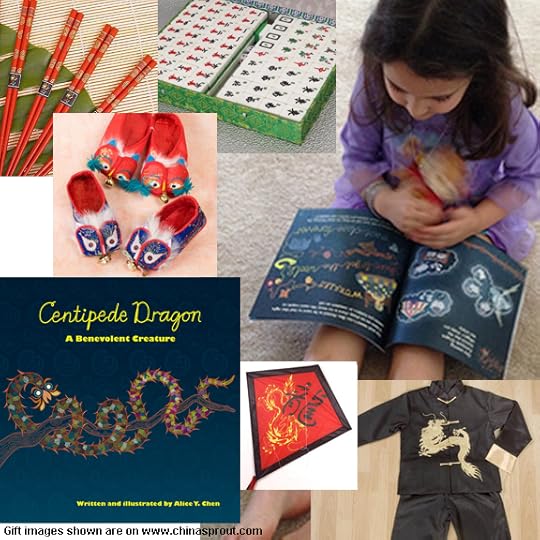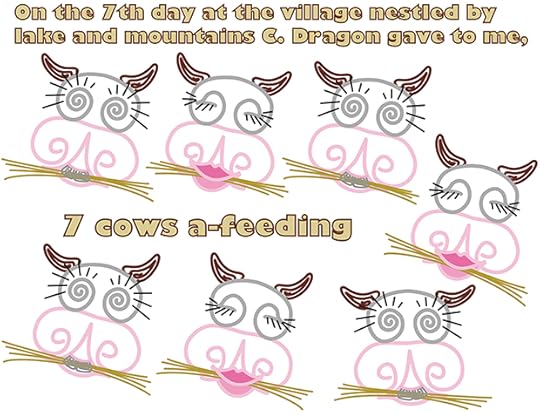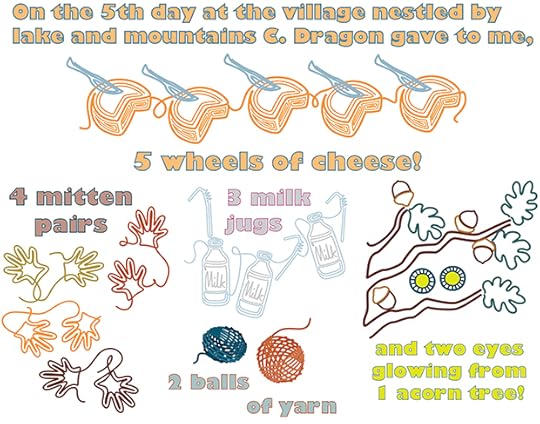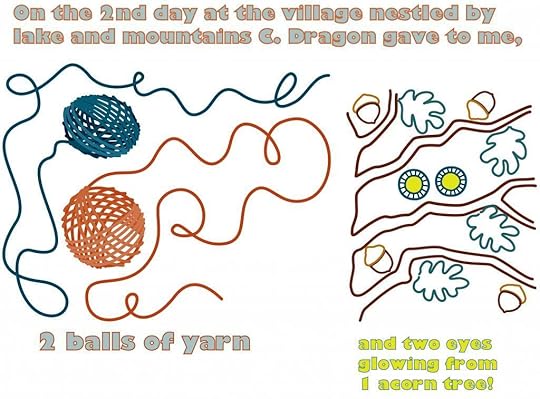Alice Y. Chen's Blog, page 13
December 19, 2014
December 18, 2014
December 17, 2014
December 16, 2014
December 15, 2014
December 14, 2014
December 13, 2014
BONUS posts: The 12 Days at a Village Neslted by Lake and Mountains

Published on December 13, 2014 07:26
December 9, 2014
More about traditional publishers
There’s A TON of information out there on how to submit to publishers, everything from what they are looking for to exactly how you should submit, and what to expect after you submit (Basically, nothing unless your manuscript gets chosen!). The great thing about the internet is that it provides easy access to us for ALL this info. The bad thing about the internet is that it provides easy access to us for ALL this info. This is one major reason I think narrowing your search as much as you can, as soon as you can makes this less daunting. There is always time to expand out, should you not find success in the first round.
The other advice I’d like to add is from personal experience, and so will be strictly anecdotal. Traditional publishers–a maddening, esoteric “old boys club” that seemingly sifts through our hopesdreamsbloodsweattears so cavalierly–KNOW what they are doing. Have you EVER bought a children’s book that was poorly printed, poorly manufactured? Chances are, not. And that quality has lasted over decades. So, exhaust the traditional publishing route, including the boutique publishers.
Self-publishing has been a real learning experience. I’ve learned so much more about graphic design in which I hadn’t had any prior experience: layout and design, and pre-press and print concerns. But I almost want to say choose this route ONLY if you have a different goal in mind for your book, aside from world domination. There is just so much more that needs to be figured out as well as executed, all in isolation. And it seems as though the only way to accomplish what needs to be done is by pounding the pavement, one library at a time, one bookstore at a time, one presentation at a time.
What I do know is that so far, there have been kids whose attentions were rapt by my character and story, there were creative adults inspired to give an Asian-themed gift to accompany the book, and that when I leave this world, it will still be around, somewhere. That’s got to be the sweetest thought that I can take to the bank.

The other advice I’d like to add is from personal experience, and so will be strictly anecdotal. Traditional publishers–a maddening, esoteric “old boys club” that seemingly sifts through our hopesdreamsbloodsweattears so cavalierly–KNOW what they are doing. Have you EVER bought a children’s book that was poorly printed, poorly manufactured? Chances are, not. And that quality has lasted over decades. So, exhaust the traditional publishing route, including the boutique publishers.
Self-publishing has been a real learning experience. I’ve learned so much more about graphic design in which I hadn’t had any prior experience: layout and design, and pre-press and print concerns. But I almost want to say choose this route ONLY if you have a different goal in mind for your book, aside from world domination. There is just so much more that needs to be figured out as well as executed, all in isolation. And it seems as though the only way to accomplish what needs to be done is by pounding the pavement, one library at a time, one bookstore at a time, one presentation at a time.
What I do know is that so far, there have been kids whose attentions were rapt by my character and story, there were creative adults inspired to give an Asian-themed gift to accompany the book, and that when I leave this world, it will still be around, somewhere. That’s got to be the sweetest thought that I can take to the bank.

Published on December 09, 2014 05:07
December 2, 2014
Questions #2, 4 and 5
Now let’s look at question #2:
2) What size publisher do I want for my book?
4) Who is their children’s book editor? What is s/he/the house looking for?
5) What does the current book list look like?

The upsides of a big publisher are obvious: they’re well-known, and have established resources and contacts for selling your book. A small publisher can focus more on your book, they take more risks on content, they are independent. I focused on big publishing houses as smaller houses generally do not have the dollars nor the manpower to devote to any one book. Not only could that result in low sales, but also, would discourage them from signing you for book 2! Since 2012 it seems the lion’s share of marketing is on your shoulders either way.
My self-publishing decision was partly based upon this now-outdated fact that I’d have to develop my own marketing plan, execute and sustain it. But there is still a fundamental difference, in that with a big publisher there's still a framework, or formula, a lot of experts in marketing, and that doors are already open to them.
Now, I understand why questions 4 and 5 are important, but I don’t quite get how I as the amateur can determine from an editor’s statement of, “…looking for professionally illustrated storybooks with an expressive voice…” that my book fits that description. OF COURSE I think my book fits!
Also, the advice I got at a conference, that if I chose a publisher that already had a book about a half-millipede, half-unicorn creature whose horn has the magical ability to help others, they probably won't publish Centipede Dragon. But you’re bound to devote a good number of hours looking through their book lists IN VAIN, using the cover image and a 2-sentence description solely to determine whether your book “fits” into the kind of book they publish. My advice, honestly, is don’t waste the time like I did. Start with ten books currently on the market that you like, see who publishes them, then look at the 3-5 most recent books they’ve published, and make a gut decision from there.
2) What size publisher do I want for my book?
4) Who is their children’s book editor? What is s/he/the house looking for?
5) What does the current book list look like?

The upsides of a big publisher are obvious: they’re well-known, and have established resources and contacts for selling your book. A small publisher can focus more on your book, they take more risks on content, they are independent. I focused on big publishing houses as smaller houses generally do not have the dollars nor the manpower to devote to any one book. Not only could that result in low sales, but also, would discourage them from signing you for book 2! Since 2012 it seems the lion’s share of marketing is on your shoulders either way.
My self-publishing decision was partly based upon this now-outdated fact that I’d have to develop my own marketing plan, execute and sustain it. But there is still a fundamental difference, in that with a big publisher there's still a framework, or formula, a lot of experts in marketing, and that doors are already open to them.
Now, I understand why questions 4 and 5 are important, but I don’t quite get how I as the amateur can determine from an editor’s statement of, “…looking for professionally illustrated storybooks with an expressive voice…” that my book fits that description. OF COURSE I think my book fits!
Also, the advice I got at a conference, that if I chose a publisher that already had a book about a half-millipede, half-unicorn creature whose horn has the magical ability to help others, they probably won't publish Centipede Dragon. But you’re bound to devote a good number of hours looking through their book lists IN VAIN, using the cover image and a 2-sentence description solely to determine whether your book “fits” into the kind of book they publish. My advice, honestly, is don’t waste the time like I did. Start with ten books currently on the market that you like, see who publishes them, then look at the 3-5 most recent books they’ve published, and make a gut decision from there.
Published on December 02, 2014 05:18
November 25, 2014
Let’s answer #1 and #3
I’m going to take last week's questions out of turn because I didn’t group them in as organized a fashion as I should have.
For question #1, do I want an agent to represent me? I’m going to be fairly ignorant on this point, because I haven’t ever really entertained the idea.

There are pros to having an agent represent your book: 1) S/he has more inside contacts in the publishing world, likely because s/he came form the publishing world, and will be able to determine to which publishing companies to market your book; 2) S/he can work with you, like an editor, to get your book to the proper publishing standards, which I CAN say from personal experience in doing this alone, would be a HUGE advantage; 3) S/he will help you in the marketing of the book, at least, in the planning and initial execution stages. It’s in the agency’s best interest for your book to sell well.
There are also cons: 1) There is an additional layer of submissions to go through, because you have to research and submit your work to many agencies/agents, just as you would with a publishing house; 2) You are not the only client the agent has, so, their time will be spread amongst many; 3) You lose some of your already miniscule royalties to the agency AND the publisher.
So the next question (#3) is time expectations. In my case, there are times in the year that would be more advantageous to release the book (eg, Lunar New Year in late Jan/Feb., or Asian American Heritage month in May). Since diverse books featuring minority children are already NOT big sellers in the marketplace, timing a publication where general interest may be higher, or being taught in schools, for instance, becomes way more crucial to success. If you’ve got no place to be, if your book happens to be of a more marketable subject like anthropomorphized animals, take the time with your submissions and keep going. It’s almost like a game of chance, where you may hit the right editor at the right time. But you don’t have a chance of doing that unless you’re submitting!
Happy Thanksgiving in advance, everyone. Stay safe!
For question #1, do I want an agent to represent me? I’m going to be fairly ignorant on this point, because I haven’t ever really entertained the idea.

There are pros to having an agent represent your book: 1) S/he has more inside contacts in the publishing world, likely because s/he came form the publishing world, and will be able to determine to which publishing companies to market your book; 2) S/he can work with you, like an editor, to get your book to the proper publishing standards, which I CAN say from personal experience in doing this alone, would be a HUGE advantage; 3) S/he will help you in the marketing of the book, at least, in the planning and initial execution stages. It’s in the agency’s best interest for your book to sell well.
There are also cons: 1) There is an additional layer of submissions to go through, because you have to research and submit your work to many agencies/agents, just as you would with a publishing house; 2) You are not the only client the agent has, so, their time will be spread amongst many; 3) You lose some of your already miniscule royalties to the agency AND the publisher.
So the next question (#3) is time expectations. In my case, there are times in the year that would be more advantageous to release the book (eg, Lunar New Year in late Jan/Feb., or Asian American Heritage month in May). Since diverse books featuring minority children are already NOT big sellers in the marketplace, timing a publication where general interest may be higher, or being taught in schools, for instance, becomes way more crucial to success. If you’ve got no place to be, if your book happens to be of a more marketable subject like anthropomorphized animals, take the time with your submissions and keep going. It’s almost like a game of chance, where you may hit the right editor at the right time. But you don’t have a chance of doing that unless you’re submitting!
Happy Thanksgiving in advance, everyone. Stay safe!
Published on November 25, 2014 10:35










